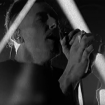In 2015, Cash Askew and Kennedy Ashlyn released their self-titled debut LP as Them Are Us Too for Dais Records. Mixing the ethereal nature of Cocteau Twins and Kate Bush with influences like the Cure's middle period, New Order and Depeche Mode, the record immediately struck a chord with audiences and the band hit the road to support the offering. Fans responded uproariously, and suddenly it seemed that TAUT were on their way up.
Then came the tragic night of December 2nd, 2016, and the fire that tore through a warehouse in Oakland, California. Known as Ghost Ship to the local community, the structure housed several artists that were part of a collective who would often host concerts in the makeshift DIY space. Local house-music label 100% Silk were showcasing their artists at Ghost Ship the evening that the fire broke out. Askew was in attendance, and was among the 36 people who tragically lost their lives.
Suddenly, and inexplicably, Ashlyn's partner and closest friend was gone. As time went on, Ashlyn slowly came to the realization that she would try to pick up the pieces and break out on her own. The task was not easy, but she was determined to find her own voice among the chaos.
"I felt so grateful that I was able to work on things with Cash — she chose me as the one that she wanted to work with," says Ashlyn. "I almost had a weird feeling that it would be disrespectful to Cash and not be honoring her if I kept thinking I was not enough. Kind of out of respect for her, I learned to respect myself."
So Ashlyn dove in to writing the solo material that would become SRSQ's debut LP, Unreality, which was released in October via Dais Records. SRSQ is Kennedy Ashlyn's rebirth, and she shines from the starting line. Her vocals soar to the same beautiful heights as TAUT and thrive in the lush production, courtesy of Matia Simovich of Inhalt. It's truly a jaw-dropping record.
In the following interview, Ashlyn candidly recounts the road that led to SRSQ's debut, and tells how she picked up the pieces after an unimaginable loss, learned to trust again and found solace in creativity in the face of darkness.
YOU AND CASH ASKEW HAD KNOWN EACH OTHER SINCE AGE 19. I WOULD IMAGINE THAT YOUR CREATIVE PARTNERSHIP, AND FRIENDSHIP, RESULTED IN AN UNSPOKEN LANGUAGE BETWEEN THE TWO OF YOU. HOW DO YOU GO FROM THAT TO LETTING SOMEONE NEW IN — STARTING FROM SCRATCH WITH A NEW PRODUCER?
KENNEDY ASHLYN That was an unexpectedly challenging aspect to starting this project and also just moving on with my life because you know, that language existed both inside and outside of making music together. And there are so many ways that like language and the way we communicate with others frames and creates the world that we live in, the reality that we perceive — hence the the name of the record.
But in terms of music, at first I was very, very hesitant to let anybody in. It was more because I felt like I would hold them to an impossible standard: wanting them to be Cash. Even if they're the best person in the entire world, no one can ever be the person who I lost. Eventually in small ways, I started to open myself up to letting people help because I was also just trying to do too much. So by the time I started working with Matia, I think just by doing it we figured out ways to communicate.
There are things that I could say to Cash like, "The snare should be like this," or even, "Can we make that bass tone a little bluer?" And she would know exactly what I was talking about. But it was definitely challenging for me, and I found myself getting frustrated with my own inability to communicate as well as I would like to. But over the course of a month we figured it out.
DO YOU HAVE A SONG ON THE RECORD THAT WAS YOUR "EUREKA MOMENT" WHERE YOU SAID "MAYBE I CAN FIGURE THIS OUT?"
I kind of always had faith that it would work out because I knew Matia and I am familiar with what he's done in the past and we worked together a little bit, so we had a little bit of a rapport. I think I'm still a little bit like, "Did we do this right? Is this good?" I don't think it's really totally hit yet, but again, that has way more to do with my own insecurities than anything he did or we did together. I think once we got the mix for "The Martyr," which is actually the last song we ended up mixing, and I heard the chorus hit on the big studio speakers for the first time, I was like, "Okay, like this is gonna happen." And I think that was also the first one we engineered but the last one we mixed. So I think that was kind of like a grounding and centering song throughout the whole process.
SRSQ BARES SOME RESEMBLANCE TO TAUT, BUT IS DEFINITELY ITS OWN ANIMAL. DID YOU CALL UPON BANDS OR CONCEPTS THAT MIGHT HAVE BEEN A LITTLE BIT DIFFERENT THAN BEFORE? THINGS THAT WERE MORE PERSONAL TO YOU?
There was very little that one person really liked and the other person really didn't like that we would bring into the project. We were very similar. I think the biggest thing is I don't really stay away from repetition and things being brutally pounded in over and over, especially on some of the earlier songs on the record, like the "The Martyr" and "Cherish." There are these relentless arpeggios that go through those. I remember when I sent demos of those to Cash, they were originally written as TAUT songs, she was like, "This is way too repetitive, dude." There are a lot of moments that she would try to create space and create difference where I was like, no, the repetition is what needs to be there. So I would definitely incorporate her voice — I'd have her voice in my ear saying, "No, pull back here," and would do so. But I think mostly, I could say the biggest difference was sometimes I would just give into myself to have like a relentless pounding thing that goes through an entire song.
One thing I will say is in making amends, I spent so much time thinking to myself, This is how Cash would have wanted it. And that was really hard — really an impossible thing to know. So with this record, I tried to let go of a lot of that because at first I would think, Would Cash think this is cool? Then I realized that this isn't Cash's project, this is mine. So I think I just had to avoid that question as much as I could and focus on making the best record I could make.
IS THERE SOME MATERIAL THAT YOU WROTE WITH CASH BEFORE HER PASSING THAT HAS COME UP IN A DIFFERENT INCARNATION?
There is stuff that I had written and sent to Cash to work on but we never got around to do it. Anything that Cash had a hand in went to TAUT. There were my half-baked ideas that I turned into stuff, but if Cash had a hand in it, it went to TAUT.
WITH TAUT YOU DID A LITTLE TOURING. DO YOU FORESEE TAKING SRSQ ON THE ROAD?
I've done a little bit mostly in Texas where I live and in California. Right now, I don't like the idea of having other people onstage. I really do want it to be just me and I think it's still a little bit of that leftover feeling of I don't know how I would relate to new bandmates and I don't really want to know how I would relate to new bandmates for this project. But I also don't want to be a weird controlling person like, "No, you have to play this note." I'm trying to like figure that out. I'm hoping to tour as much as I possibly can and as far as I can.
CONSIDERING THAT YOU'VE REVAMPED THE WAY YOU'VE APPROACHED SONGWRITING FOR THIS RECORD, WHAT DOES YOUR CREATIVE PROCESS LOOK LIKE?
I very rarely go into like writing a song with like, "All right, I'm going to write a song about my sadness about this thing or like my relationship about this person." What happens a lot is I'll just be playing around with different tones and words. I like to do it pretty loud because frequencies are able to resonate in the room and in whatever specific amp I'm using. That guides a lot of songwriting for me, but there's been a lot of moments where I find the right tone or the right chord or the right little melodic phrase that really brings me to tears. As soon as that moment happens, it can sort of write itself, though that's not true for every single song. I would say a good 70 percent of the music I write happens that way, even to the point that the lyrics write themselves because I'll start with vowel sounds and the melody and then as soon as I feel that depth of emotion, I know what it's about for me.
DO YOU WRITE ON THE KEYBOARD?
Yeah. So far that's what I've been doing, but I'm interested in picking up the guitar as well.
AS FAR AS MUSICAL REFERENCES, HAVE YOU BEEN LISTENING TO ANYTHING NEW OR UNEXPECTED THAT'S INFLUENCED SRSQ?
In terms of what music I listen to, lately it's been mostly things that fit into the world that I'm in. So I listened to Rudimentary Peni for the first time ever recently somehow, and then on the same day Lana Del Rey and Roy Orbison. Obviously these things are super different, but there's a nugget of similarity in there of between all of them. I don't really listen to a lot for inspiration per se. I have to get myself to the point where I can be a functional person and also be a creative person, so music does that a lot for me.
IT SOUNDS TO ME LIKE YOUR ATTRACTED TO STRONG VOICES AND STRONG SONGWRITERS ...
That's definitely true. There's a lot of that. But also I think texture. Textures that really like grind or textures that can feel really regal — I guess a certain kind of shimmer. One of my favorite records is The Horrors' Primary Colours, which came out when I was a teenager and it was the first record I ever heard that had textures like that. I'm attracted to really moody music. I'm attracted to music that's moody or angsty without being too overtly angsty. I'm definitely more mood and persona driven, but then again there is a lot of stuff out there that is all mood and no substance. It definitely needs to be a balance.
WHAT DO YOU THINK YOU LEARNED THE MOST ABOUT YOURSELF IN PICKING UP THE PIECES AND GOING SOLO WITH SRSQ?
I think primarily that I can do it and that is something that I really want to do. Before Ghost Ship happened, I had a lot of backup plans and after I was like, "There's really nothing else I want do." So I pretty much committed to throwing myself into it as much as possible and now I'm learning how to do that and structure my life so I can do that.
But I think I also learned to value myself as a musician and a person because I felt so grateful that I was able to work on things with Cash — she chose me as the one that she wanted to work with. I almost had a weird feeling that it would be disrespectful to Cash and not be honoring her if I kept thinking I was not enough — because she thought I was great. Kind of out of respect for her, I learned to respect myself, which is kind of a round about way of going about it. I think from there I was able to find my own vision as an artist and as a person. I think it's a process.












